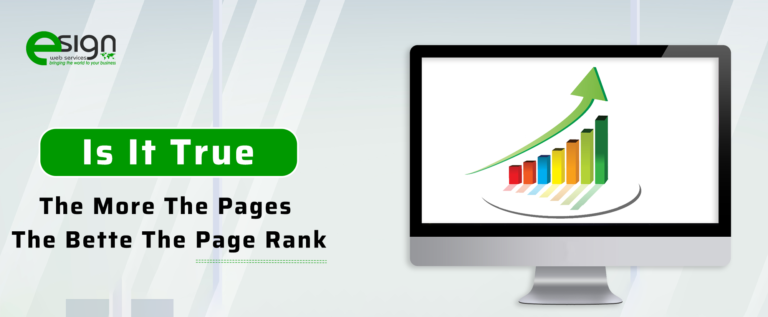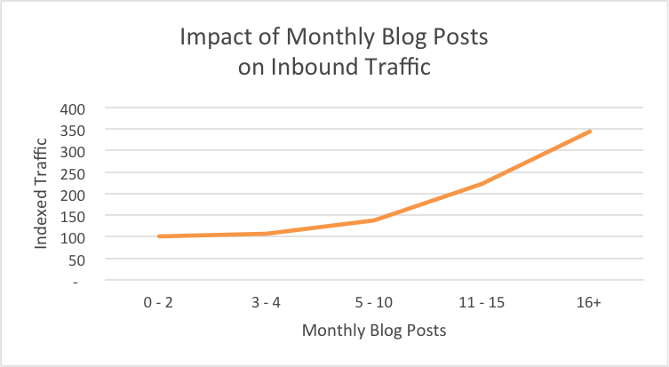Is it true – The More the Pages, the Better the Page Rank

Search engine optimization is not a new concept. And over the years, a significant amount of people have come to use it in their marketing approaches.
However, not every individual who gets introduced to SEO understands it completely or keeps themselves updated with its changes. And this has led to several misconceptions and contradictory statements on how one can confirm high ranking.
At present many people still wonder, “are more pages better for SEO or not”, and hardly anyone has a solid answer.
This is because there isn’t any.
The answer would vary depending upon several factors, just like ranking itself does. So it is best to unfold every aspect of pages to understand if more pages will help you top SERPs or not.
How do Search Engines perceive Web Pages?
Search engines are AI, but they perceive web pages as any human would, like pages. However, they cannot exactly see them but read the HTML codes a page is based upon along with its text.
While you can see all the elements on a site’s page, search engines would only read the text and HTML codes.
Also, it would see where the pages can take one to and if those pages are relevant or not. It is the site map of the website through which they try to gauge the number of pages it has.
How to Count Pages?
Counting pages of a site are not that difficult, and just like search engines, you too can count them yourself.
So, if you are questioning, “how many pages does a website have”, all you have to do is a simple Google search.
Let’s say the site you want to count the page of is “www.abcde.com” so what you need to do is type “site:www.abcde.com” on the Google search bar. Once your click on the magnifying glass, the search engine will return with a certain number of results.
The number of results you get for this particular search is the pages Google crawled and indexed from it. This might not be the exact number of pages on that site, but it definitely is a close approximation.
You can further divide the number of pages based on the language versions of a site but using additional suffixes like “/en”, that is “site:www.abcde.com/en”.
Now that you know how to check the number of web pages on a site let’s understand what number of pages Google prefers.
Big vs. Small Companies What Does Google Prefers?
The World Wide Web has companies of all different sizes, but one can simply divide them into two categories that are big and small. Understand, here big and small is not dependent on how vast or popular the company is.
Rather here, the single metric to determine their size is the number of pages they contain. Through this, you will get a better insight on the question, “are more pages better for SEO, or limiting the number is the way to go”.
1. Big Company
Website owners expect these company sites to perform better as Google always states that content is the King for it. However, in the practical scenario, it is seen that content cannot improve a site’s performance on its own.
Moreover, there is always a change of redundancy when there are numerous pages under similar topics. Also, if you are not using a credible SEO agency to look after the content your site publishes, a big volume might result in poor user experience (UX).
This usually happens when service providers do not know how many pages should a website have for SEO.
2. Small Company
On the other hand, small business websites have a low number of well-performing pages, reducing their rank altogether. Since Google tends to trust sites with more well-performing pages in terms of UX, bigger websites get an advantage over smaller ones.
However, you do not always need an awful amount of pages to see more pages to help a fraction of them perform better. Instead, you can always optimize the few pages on your site properly and reach your target audience.
Google’s this behavior further complicates the question “are more pages better for SEO or not”. But one thing is evident that bigger sites tend to have a slight upper hand when it comes to pleasing the search engines.
Advantages a Big Website Enjoys
More pages mean that there is a higher probability of ranking high on the SERPs. This further becomes one of the determinants for ranking a site as a whole.
But you have to understand that this advantage is not just due to a high number of web pages, but the high number of “well-performing” pages. So, if you produce low-quality pages in bulk, it will just occupy unnecessary server space.
So if you want to know how to rank on the first page of Google, focus on quality.
But does that mean you should not consider quality as a factor?
Quantity or Quality?
If you are looking for a definite answer on which one to prioritize and which to ignore, then understand that they are both important.
However, you can deduce which one plays a more significant role when it comes to page ranking.
HubSpot, through its survey, has found the number of blog posts a particular company should post in a month.

After surveying over 13,500 of its customers, it was deduced that almost in every case, more blog posts meant higher inbound traffic.
This means that quantity does have a positive effect on a site in terms of traffic generation. But do not jump to conclusions just yet as if you slack in terms of quality and churn excessive amount pages.
The Role of Doorway Pages
The average number of pages in a website depends on the type of business it talks about and the topics it discusses. There is no such thing as too many pages, and you can create as many of them as you want to, given they are all unique and informative.
This is because, according to Google, pages with similar content that lead to the same site location are doorway pages. These pages are designed to manipulate a search engine’s requirements to satisfy local search intent.
Many sites choose to produce such pages in bulk with the high hopes of ranking high on multiple SERPs. But Google Algorithms have developed significantly over the year, and now they can detect thin content that has no other purpose but ranking.
It has applied machine learning and takes leads from numerous places to ensure only high-quality content makes it to the search results. Hence, creating multiple baseless posts will only negatively impact your site’s DA.
So, are More Pages Better for SEO?
In a general sense of terms, yes, having more pages can help your site rank better. But it will only work if you do not go overboard and generate informative pages.
A site’s performance depends more on the visitors than Google, as it also supports what the mass approves of. So, you would have to write content that meets your target audience’s search intent, and they actually find it interesting.
But creating unique, interesting, and informative content is much more time-consuming than the scrappy ones.
If you ask, what is an ideal number of pages recommended by Google on any website? Of course, there might not be a definite answer. However, you know what kind of content the search engine likes.
Hence, it is better to move from this mundane flow of thin content and create a strategy that actually works.
How to Shift From This Stale Strategy?
The foremost thing you need to do is focus on providing your readers with quality content that they will appreciate and share. This way, you can improve your site’s visibility even without writing more pages.
Target long-tail keywords and create content with a huge amount of facts and information in them.
Also, if you find it difficult to create pages on your own or decipher the true answer for “are more pages better for SEO”, hire an SEO agency. They have been practicing search engine optimization for years and know what kind of site would require what type of assistance.
Tips to Improve the Rank of Internal Pages
Apart from availing assistance from SEO professionals, you can also apply certain tactics yourself to achieve a better SERP position. Some of the most effective strategies for that are:
1. Pass More SEO Juice to Them
As per a blog by Neil Patel, about 82% of agencies and 74% of companies stated that they incorporate social media in their SEO strategy even if it is not that prominent in the plan.
A steady uninterrupted flow of traffic and signals from social networking sites will boost your site tremendously. However, do not waver from this strategy if you do not find much information to back this up.
Leveraging social platforms to improve search performance is a relatively new concept. However, you will find multiple that suggests its importance in SEO.
2. Use Branded Keywords to Interlink Pages
Branded keywords are phrases or search terms that contain a part of the entirety of a brand’s name.
For instance, the branded keyword phrases for Shopify would be Shopify SEO, Shopify SEO for small businesses, etc.
You can use these for your brand and interlink your pages through them. Not only it will help get better anchor texts for your pages, but these keywords will circulate as search terms in the future.
3. Build Deep Links to These Pages
It doesn’t matter how many pages you have on your site if most of them are inactive. They are of no use to your customers and offer no value to you as well.
By interlinking your site’s pages, you are not only spreading your traffic across your site but making these inactive ones visible as well. Your job is to make sure that your site’s internal pages are crawlable to ensure they provide some benefit.
Conclusion
Website pages more or less will only matter if it’s content meets search intent. You can use the old doorway method to gain a temporary hike in traffic, but they will eventually result in a penalty.
Hence, to answer “are more pages better for SEO,”, no it is not. Rather spend your time and effort building your brand through social signals and branded keywords.



I am truly delighted to read this webpage posts which contains tons of helpful facts, thanks
for providing these statistics.
Everything is very open with a really clear description of the issues.
It was really informative. Your site is extremely helpful.
Thanks for sharing!
I am extremely impressed with your writing skills. Keep up the nice quality writing, it is rare to see a great blog like this one these days.